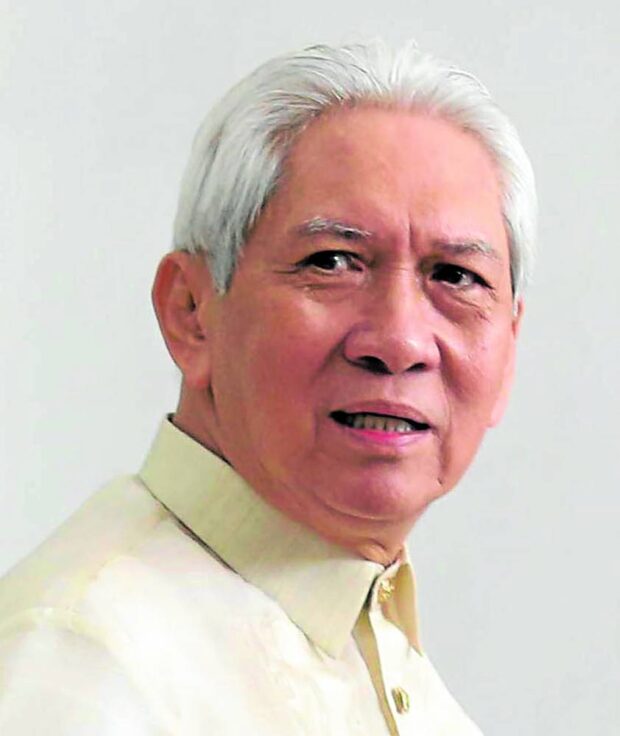
Ombudsman Samuel Martires —INQUIRER FILE PHOTO
Ombudsman Samuel Martires issued a clarification on Wednesday about his controversial proposal not to make public the Commission on Audit’s (COA) initial audit findings or the audit observation memorandum (AOM), saying he was actually referring to the annual audit report (AAR).
“The Ombudsman assures [the public] that it is not protecting erring and corrupt government officials and employees with its firm belief that only the Final Audit Report ought to be published and shared with the public since the Annual Audit Report could still be taken up on appeal before the COA en banc and the Court,” he said in a statement.
Martires also stressed that his office was “fully committed” to pursue its mandate as “protectors of the people” by ensuring that its processes were “fully aligned with integrity, transparency, and accountability in public office.”
But under COA circular 2009-006 dated Sept. 15, 2009, the AAR is defined as the “final output of regular yearly audit” conducted by a state auditor of the accounts and operations of a government agency. The report consists of the auditor’s certificate, financial statements, audit observations, and recommendations.
‘Tentative finding’
Section 17 of the same circular, which discusses decisions and appeals, states that only notices of disallowance and charge can be appealed. There was no mention of whether an AAR can be appealed.
On the other hand, an AOM is a written notification to the agency head and concerned officer about deficiencies noted in the audit of accounts, operations, and transactions. It requires the submission of comments about the deficiencies and supporting documents within a reasonable period.
Former COA Chair Grace Pulido-Tan, in text messages to the Inquirer, explained that an AOM simply contains observations that auditors want a particular government agency to explain, justify, and substantiate with documents within 60 to 90 days.
“Hence, it is a preliminary and tentative finding that may be explained away in the course of audit,” she said. “It is when the AOM is not satisfactorily explained or justified that COA makes a ‘finding’ and this is found in the [annual] audit report. That’s the one that is published, so to speak, as audit reports are posted on the [agency’s] website, which is accessible to the public.”
The Inquirer asked the former COA chair what she thought of Martires’ proposal but had yet to get a response as of Wednesday night.
Worse suggestion
For House Deputy Minority Leader and ACT Teachers Rep. France Castro, however, it was worse than his original one as “AARs are normally used by media, nongovernment organizations, and other corruption watchdogs to see if indeed government agencies and officials are using [taxpayer] money judiciously and are not enriching themselves.”
In a statement, she noted how AARs have exposed “many anomalies” in the government such as the Pharmally mess, the procurement of alleged overpriced laptops by the Department of Education (DepEd), and the P125 million transfer of confidential funds to the Office of the Vice President in 2022.
Sen. Risa Hontiveros also scored Martires’ suggestion as she reminded him that taxpayers deserve to know how their money was spent.
In a statement that was issued before the Ombudsman came out with his clarification, Hontiveros said that hiding AOMs from the public would further weaken the government’s ability to promptly flag and investigate irregularities in the use of public funds.
“Good governance requires more, not less, transparency on the use of precious public funds. We should have no reason to fear public scrutiny if we maintain a clean government,” she stressed.
She also cited how COA audit reports helped expose a number of large-scale fund scandals in the country, including the P10-billion Pharmally fund scam, the alleged irregularities in the Commission on Higher Education’s UniFAST program, the fund anomalies involving the Procurement Service of the Department of Budget and Management (PS-DBM), the overpriced laptops bought by DepEd through the PS-DBM, and the wastage of millions of doses of COVID-19 vaccines under the Department of Health.
‘Very useful’
For former Sen. Panfilo Lacson, COA reports proved “very useful” in his scrutiny of the annual budget proposal and other legislative inquiries during his three terms as senator. “I have no doubt like-minded legislators also share the same observation,” he said.
He added that COA reports also guide and help individual lawmakers and Congress craft policy decisions in the performance of their legislative duties.
“In turn, the public is also properly informed of the efficiency or laxity of their government officials in this regard,” Lacson said.
Martires made his unsolicited suggestion about the nonpublication of AOMs during a House hearing on his office’s budget on Monday, saying it would prevent the public from prejudging those involved.
His proposal, however, drew flak from activist groups which asked why the country’s “top graft buster” would advocate “greater opaqueness rather than transparency” in government.
They also noted how Martires has restricted access to the statements of assets, liabilities and net worth of top government officials in addition to putting a halt to the conduct of lifestyle checks on public officials.
While there is no law that explicitly requires the publication of AARs or AOMs, the COA has regularly published the AARs of government agencies and state corporations on its website, while the AOMs are sent directly to the concerned government agency.
But a regular provision in the yearly General Appropriations Act requires government agencies and state corporations to submit audited financial statements, annual reports, and a report on the utilization of their funds to the Department of Budget and Management and Congress or to post these on their website.
RELATED STORIES
Ombudsman wants COA memos out of public eye
Solon threatens to cut off Ombudsman’s secret funds if its dignity is tainted
Despite RA 6713, Ombudsman says no law mandates submission of SALNs